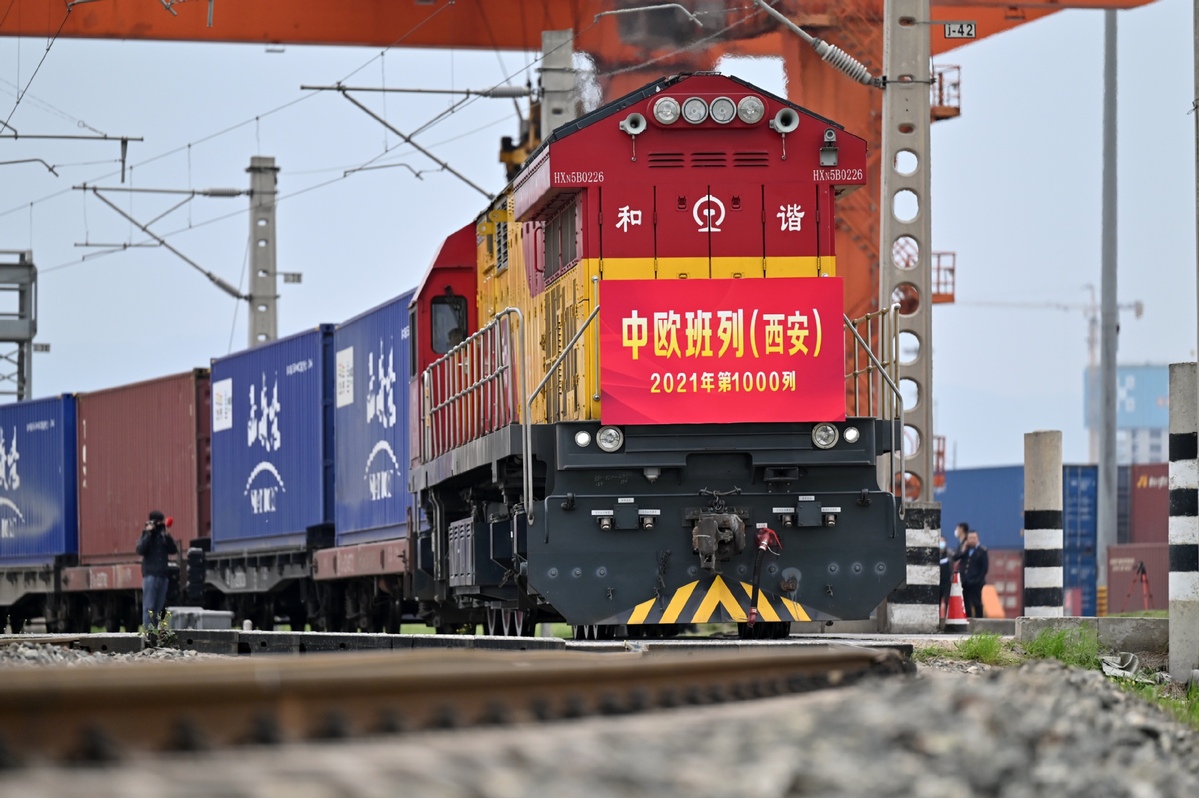China-Europe freight trains eye infrastructure

Photo taken on Aug 4, 2022 shows freight trains at Xi'an International Port in Xi'an, Northwest China's Shaanxi province. [Photo/Xinhua]
Beijing to intensify efforts to advance digital, smart development of routes
China is willing to cooperate with countries along China-Europe Railway Express lines to jointly promote the construction of major infrastructure projects to better enhance the capability to ensure smooth operations of freight train services, a new report said on Thursday.
The 2021 China-Europe freight trains development report, compiled by the Office of the Leading Group for Promoting the Belt and Road Initiative and China State Railway Group Co Ltd, said China stands ready to work with those countries to jointly study the establishment of intergovernmental cooperation mechanisms for the China-Europe freight trains, build a stable international industrial and supply chain system, as well as carry out research on new technologies and equipment.
Looking ahead, the report said China is ready to intensify efforts to boost the digital and smart development of China-Europe freight trains, jointly enhance implementation and standardization of regulations, policies and technical standards as well as promote digital applications of the trains.
Notably, China will continue to give full play to the role of the Belt and Road Special Lending Scheme, the Silk Road Fund and special investment funds in boosting connectivity between the two continents. More efforts will also be made to develop Silk Road themed bonds and support the effective operation of the Multilateral Cooperation Center for Development Finance, a joint financial mechanism designed to promote high-quality infrastructure and connectivity investment in developing countries through partnerships.
Xu Jianping, director of the Department of Regional Opening-up at the National Development and Reform Commission, said at a Thursday news conference in Beijing that the China-Europe freight trains have played a key role in strengthening international economic and trade ties.
Xu said the trains have become increasingly important in deepening cooperation between the two continents, supporting China's regional economic development and ensuring the security of industrial and supply chains.
In the next step, Xu said the Office of the Leading Group for Promoting the Belt and Road Initiative will work with relevant parties to actively promote the upgrading of some domestic sections of railways and renovation for capacity expansion of key ports along the China-Europe railway express, and expand new transportation corridors with countries in regions including Central and Eastern Europe, Central Asia and Western Asia.
As of end-July, a total of over 57,000 China-Europe freight train journeys were made, carrying 5.3 million twenty-foot equivalent unit containers of goods worth nearly $300 billion. With a 98.3 percent comprehensive heavy container rate, the trains reached 24 countries and 196 cities in Europe, Xu added.
Since the COVID-19 pandemic began, the railway has served as a lifeline for freight transportation between Asia and Europe. As of end-July, China-Europe freight trains have transported a total of 14.2 million pieces and 109,000 metric tons of anti-pandemic supplies to Europe.
Xia Jun, deputy director of the Department of Port Control at the General Administration of Customs, said the China-Europe freight trains are playing an increasingly important role in promoting economic and trade ties between the two continents and stabilizing industrial and supply chains.
In 2021, China's imports and exports with the 24 countries along China-Europe freight train routes reached 6.88 trillion yuan ($1.01 trillion), up 19.7 percent year-on-year, said the administration.
Xia said the administration will step up efforts to continuously support the development of new businesses such as cross-border e-commerce and international postal services.
Zhuang He, director of the Freight Transport Department at China State Railway Group, said the group is holding talks with railway companies in Russia and Kazakhstan to promote paperless transportation based on mutual recognition of electronic signatures.
Meanwhile, under the cooperation mechanism of the joint working group on China-Europe freight trains transportation, relevant parties are studying an implementation plan on blockchain information tracking to further expand the scope of information sharing and provide convenient services for customers.


